Blankets of Sound
Jessica Pavone, Henry Birdsey, Achim Kaufmann, Marie Krüttli, BUBU, Jessica Pratt
Welcome to another overstuffed edition of the Nowhere Street newsletter. If you’re reading this as an email that arrived in your inbox be forewarned that you can’t see all of its contents due to limitations of the software. But you can always find anything that’s been cut-off due to length by visiting the web-based version here.
Jessica Pavone’s Addictive Sonic Inquiries
It’s crazy to think that I’ve been following with the work of violist Jessica Pavone for more than two decades now, observing her early steps as a student and collaborator of Anthony Braxton, developing a singular duo language with guitarist Mary Halvorson, and playing in a wide array of working groups, whether Taylor Ho Bynum’s old sextet or the art-rock band JOBS. I think it took Pavone quite a while to find her voice as a composer and violist, but over the last decade she’s been one of the most gripping and satisfying figures in experimental music, whether playing solo or leading a variety of string-oriented ensembles. Despite her Wesleyan pedigree, Pavone always seems to take her own path, pushing away her academic background and rejecting the institutional creep of contemporary music for a deeply intuitive approach and ethos.
Over the least eight years I don’t think there’s a single recording by Pavone that I haven’t found deeply satisfying, as her music tangles with tuning, cymatics, psychedelic harmony, natural resonances, and folky evocations.I feel like she busted it all open beginning with her 2016 album Silent Spills (Relative Pitch), locating a rich area of investigation that continues to yield fruit today. She recently released another solo gem for Relative Pitch called What Happens Has Become Now. It’s a worthy addition to her discography, but it does indicate some exciting potential shifts in her work. “Wrong Worked That Way, and It Worked Good” is something of an outlier, as Pavone uses the “Sword Viola,” a hybrid instrument made by Ken Butler, that produces a rather untamed mass of sound that at times suggests a collision of a viola and a daxophone. In a recent interview published by postgenre.com Pavone explained how she approaches this unwieldy device, saying, “I play it while holding it like a viola at times, but mostly, I’m bending the sword against the floor. Also, the sword needs to be amplified to make a sound, so I am playing it through my effects.” She uses it to produce dense yet slithery shapes marked by friction and bent pitches within a truly alien soundworld. The album concludes with “Unrequited Renouncement,” a seething noise piece made with viola that leaps violently out of the speakers, but over the course of its seven minutes Pavone seems to wrestle with sound, gradually gaining control and harnessing the wild din into a nuanced meditation.
Pavone performs solo in Berlin on Sunday, November 23 at Ausland, sharing a bill with an intriguing quartet featuring drummer Jim Black, guitarist Keisuke Matsuno, accordionist Andrea Parkins, and vibraphonist Evi Fillipou. For this concert Pavone will stick with unamplified viola, which is the focus of the other two pieces on the new album. Although the music is all of a piece, Pavone steadily explores discrete ideas or gestures in every composition, and while I don’t always know what those notions are, the process is always absorbing. To wit, I love the grainy friction, creaky double stops, tickling overtones, and groaning arco gestures that distinguish “Below the Threshold of Sensation,” which you can hear below. But don’t get the idea that a single piece can define the broad range Pavone has been transmitting these days.
Instruments are Mere Tools for Henry Birdsey’s Transformative Sound World
Nearly two years ago I wrote about the awesome, richly detailed drones of the New England duo Tongue Depressor, who will be back in Berlin for a November 30 performance at Roter Salon. The duo’s two members, Zach Rowden and Henry Birdsey, both have incredibly active practices outside of Tongue Depressor, and, in fact, the latter is also busy with a terrific post-old timey experimental quartet called Old Saw. Birdsey will play solo this week, sharing a bill with cellist Judith Hamann at KM28 on Wednesday, November 20. He’ll be playing bagpipes, the same instrument he used on the Tongue Depressor date I previewed, but it’s hardly the only tool in his arsenal. In fact, I don’t think Birdsey really cares about what instrument he plays as long as they invite a rich world of vibratory harmonic possibilities.
I’ve been enjoying a 2023 album called Two Harmonicas in the Jeweler’s Court (Poole), which, as the title suggests, finds him playing harmonica—but not just any old harmonica. He accidentally flipped the reed plate of a diatonic harmonica after cleaning it and discovered a new world of sound. As Liam Herb writes in his liner notes, “Birdsey inadvertently created a warped and beating stepchild of a harmonica that could produce all of its sound simultaneously with the air traveling in one direction.” Normally, only half of the instrument’s sound possibilities can only be articulated at one time, either by blowing air or sucking it in. On Onrays (Gertrude Tapes), a recent album by Formant, Birdsey’s duo with violinist Austin Larkin, he plays pedal steel guitar, creating a truly mind-warping blend of unstable harmony, where the tonal profile of each instrument is totally out of whack, smeared, clogged, and disrupted by thick resonance. I have no fucking clue what Birdsey is doing, but he seems to have virtually invented the instrument’s possibilities. Below you can hear “Oval Window,” but I recommend digging into the whole album, as the blend of sound is so initially weird it takes some adjustment to really focus in on what the duo is creating.
Last year Birdsey also released an excellent solo bagpipe album called Air Drain (Soundholes), which I imagine will give readers a sense of what’s in store at the KM28 gig. While some of the pieces begin with a very familiar sound, as the piper locks into the tuning, Birdsey quickly departs from any expected trajectory other than a glorious drone where he can dig deep into the viscous, churning harmonies. Unlike some of the other instruments in his arsenal, bagpipes excel at providing a steady pitch to build from. Below you can check out “Offset Airs”, Its hypnotic beating patterns are staples of Birdsey’s work, and they function like a drug for me, perpetually pulling me back in for more.
There’s No Hiding Achim Kaufmann’s Nonchalant Versatility
It can be depressing when musicians who routinely pursue multiple avenues of expression are often overlooked by gatekeepers—whether the media or concert programmers—because they can’t be pinned down to a single aesthetic or practice. It feels like the most natural thing in the world that musicians would follow their interests down varied pathways. While there’s nothing wrong with an artist who assiduously sticks to a specific thread if it provides nourishment, challenges, and depth, most humans value variety. But too often when musicians seek out that variety they are brushed aside if not boxed into one aspect of their creative diapason because it’s too complicated to grapple with someone who contains multitudes. I feel like German pianist Achim Kaufmann fits this dilemma perfectly: few improvising keyboardists can match his mastery in so many different—albeit related—approaches. He’s been an active presence in Europe since the late 1990s, both as a leader of multifarious projects as well as a versatile sideman. I’ve yet to catch his new collective trio with bassist Nick Dunston and drummer Mariá Portugal, which performs at KM28 on Thursday, November 21, but I’ve heard only positive notices about the music it makes—you can see a video clip from an early performance a year ago here. In the context of the points I’ve made above, this trio seems perfect for Kaufmann, given that both Dunston and Portugal embody a similar artistic mobility.
I’m not going to wade into Kaufmann’s broad discography here—it would require much more time and space than I have this week—but it’s impressive. He’s played in a slew of working ensembles and ad hoc groupings over the years, and he routinely adapts his playing to the demands of each context. He’s rooted in jazz tradition, but he can also thrive in wildly abstract settings, whether free improvisation is on the table or post-classical ideas are at work. I only recently discovered Nowhere One Goes (Jazzwerkstatt), his terrific duo album with Yorgos Dimitriadis, a Berlin-based Greek drummer, from 2019. In this improvised session Kaufmann is at his most abstract and experimental, employing a variety of extended technique and piano preparations across four gripping pieces that bristle with refined interaction, shimmering texture, and frenetic rhythms—the closing piece veers closer to pure experimentalism, with sound deployed as modeling material. Below you can hear the scintillating “Ersilia.”
While many pianists devoted to pure improvisation possess strong jazz backgrounds, many of them put that practice to the side, but Kaufmann continues to embrace that foundation, particularly through his long and fruitful partnership with the veteran Amsterdam reedist Michael Moore, which goes back more than 25 years, in various projects. Their most productive endeavor is a long-running duo, which recently released ’22 (Ramboy), a double CD comprised of original tunes and a clutch of Andrew Hill classics—a follow up to the three albums the pair issued back in 2013 which blended their originals with gems by Herbie Nichols and a series of duo improvisations. The new release captures the pair in a decidedly lyric, tradition-based approach. Moore’s clarinet playing on “La Verne,” a tune Hill wrote for his first wife Laverne Gillette that was originally featured on his brilliant Blue Note album Smokestack—where it was titled “Verne”— is a marvel, a time-traveling solo that together with the pianist’s lush chords somehow connects Hill to Ellington. Kaufmann’s “Factorials” captures his indelible mix of finely wrought melody and brooding harmony, illustrating his innate ability to straddle tradition and experimentation through a deeply personal language. You can hear it below.
Marie Krüttli Gives the Drummer Some
In the liner notes to her recent trio album Scoria (Intakt) the Berlin-based Swiss pianist Marie Krüttli asserts, “For a long time I wanted to be considered 100% as a pianist. Now I feel more free, I just want to create, express myself and dare.” I’m not exactly sure what that means, although Kevin Le Gendre, who wrote the essay, interprets the comment as a statement of the pianist’s growing engagement as a producer and her increased embrace of technology. I’m not familiar enough with the Krüttli’s career arc to weigh in on that matter, but I don’t hear either shift making a big mark on the new album—the first with new drummer Gautier Garrigue joining her and longtime bassist Lukas Traxel— apart from the closing piece “Berceuse Honnête II,” a more floaty, reverb-drenched ballad that’s heard earlier on the album in a much drier, more transparent iteration. But I do find the album to be much stronger and more affecting than anything she’s done previously. The group performs on Wednesday, November 20 at Panda Theater.
Krüttli has a fairly mainstream, vaguely European aesthetic, a lyric, introspective quality that yielded meandering and chilly results on Transparence, her 2023 solo album. She hasn’t abandoned that aesthetic on Scoria, but the way she interacts with Garrigue and Traxel feels more inspired and exploratory than on earlier trio recordings, particularly in terms of time. There’s an elastic quality to the inner workings, with the musicians sometimes coming together for precise arrangements marked by pin-point accuracy, only to slacken and allow greater space, fluctuation, and conflict. There are numerous pieces that convey a delicious tension through theway she plays over the groove. On “Thinky Hearts” she unleashes eloquent, frequently changing cadences and densities that align and separate from the figures shaped by her partners, but nothing is more captivating than “My Lovely Brain,” a tune influenced by Meshell Ndegeocello where the bassist and drummer simulate a kind of head-nodding loop that Krüttli deftly pushes against by articulating lengthy phrases that are a bit out of sync with that groove, almost like a mini-Steve Reich phasing gambit that never resolves itself. It’s my favorite thing on the album. While most of the recording is quite restrained, there are a few stormy excursions, such as the endlessly churning waves of crashing piano in “Rewire” or the spry, accelerating and decelerating machinations of “Balthazard,” which you can hear below. Sometimes I can sense a touch of the multivalent comportment of Paul Bley—at once deeply melodic and emotionally fraught—but more often I detect the direct emotionalism of Bill Evans, a quality driven home by the title of the piece “Conversations With My Old Self,” which doesn’t feature her playing in conversation with herself, old or present, but with her trio, in one of the more splintery, multipartite excursions here.
BUBU’s Ornettish Bebop Redux
For the last couple of years I’ve been encountering the names of the three musicians who worked together as BUBU, but until I heard the group’s breezy yet gripping sophomore album, which arrives on Trouble in the East on November 25 I’d only heard their work here and there, usually in sideman contexts. Alto saxophonist Paul Engelmann, bassist Ben Lehman, and drummer Martial Frenzel recorded the music on 10 in Berlin in February of last year, fresh from an extended tour through the Baltics where the trio was firing on all cylinders. The music they create together embodies a certain kind of simplicity—including the crystalline themes, the lack of ornamentation, and the no frills, direct production—with a buoyant, energizing strain of freebop that isn’t afraid to reveal 50s and 60s American influences. Even though the trio has existed for nearly a decade, BUBU is rightly focused on celebrating and developing an internal rapport within a familiar language. You can practically hear the joy and camaraderie they feel together in the music.
It's impossible to miss how Engelmann has absorbed ideas from Ornette Coleman, whether in his crisp, bracing tone or the bouncy, elated spirit of the melodies, but alongside Lehman and Frenzel those ideas mutate into something less specific. At other times I can’t help but hear the breathless agility of Charlie Parker, although in all cases Engelmann transmits a more manic, rough-edged attack than those progenitors, with spasms of Albert Ayler’s gospelized cries. You can hear that full range on “Ausflug zum Strand,” with its bebop quotes, below. As a unit Bubu hits an admirable sweet spot, forging an elemental sound that provides that memory jolt of what attracted many of us to jazz in the first place. I’ve been cranking up the record, leaning into the metallic tang of Frenzel’s highly active ride cymbal and the springy tone of Lehman’s propulsive lines, reveling in how it all interlocks with Engelmann’s rangy improvisations. They’re all skilled players, but they seem to have privileged a certain ensemble vibe more, connecting in the moment, embracing unexpected consonances, and strapping into a groove here, some counterpoint there.All three musicians contributed compositions for the album, although they tend to be pitchy, themes built for expansion and elaboration. It’s a working band and it shows. BUBU marks the album release on Saturday, November 23 with a performance at Raumerweiterungshalle.
Jessica Pratt’s Murky Pre-Rock Pop Splendor
It remains amusing and amazing to still read reviews of recordings by Jessica Pratt that instinctively label her a folk singer. Until the release of her fourth and best album Here in the Pitch (Mexican Summer) back in May she has primarily accompanied her singing solely with an acoustic guitar, or, once in a while, simple piano playing. I guess that makes her a folk singer to a lot of people that write about music, but around here that’s a load of hooey. She’s still picking out acoustic guitar patterns on the new record, the first to feature arrangements using more than a couple of instruments, but from the very beginning Pratt’s music has revealed almost zero connection to American folk traditions. The guitar was just a tool for an artist with an elusive gift for creating gorgeous melodies that often take unexpected turns. Her songs reflect an old-school, pre-rock pop sensibility that seems variously impacted by the work of Burt Bacharach and Brill Building songwriters, with bits of chanson and bossa nova sprinkled in. I’m also reminded of Petula Clark and “I’ll Be Your Mirror” Nico, to say nothing of Broadcast’s Trish Keenan.
The album opens with a sense of grandeur and occasion with “Life Is,” where post-Phil Spector drums, layers of guitar and Mellotron, and sturdy bass suggest a new and bolder persona. Nothing else that follows retains that mode, as the music pivots to something more modest, and the clouds of reverb that have always given her tunes a milky murkiness, define the production. But Pratt’s tunefulness emerges with greater force than ever, whether it’s the snazzy overdubbed harmony vocals limning her creamy delivery on the gently sashaying “Better Hate,’ which also contains contrapuntal delights like the washed-out baritone saxophone lines played by Al Carson. Check it out below. The album has a clear retro vibe, but subtle production flourishes, such as the way the snare accents on “World on a String” pierce the washy haze, give the arrangements an appealing 3-D quality that feels decidedly contemporary. Most of the songs evoke a kind of 60s easy listening vibe, but their surface calm and narcotic glaze feels undermined by a pervasive sense of ripeness that verges on rot. I don’t get much from Pratt’s lyrics, which are insular to the point of gibberish, but they’re clearly dealing with heavy emotions and difficult life choices, making plain that all is not what it seems. The ultra-sparse “Nowhere it Was” conveys that darkness more explicitly, as a bossa groove meted out by a primitive drum machine, chilly organ swells, and a metronomic guitar chord can’t disguise the darkness. Pratt, backed by a four-piece band including her close collaborator Matt McDermott on keyboards, performs in Berlin on Monday, November 25 at the Columbia Theater.
Recommended Shows in Berlin This Week
Novemer 20: Wand; Pult, 8 PM, Neue Zukunft, Alt-Stralau 68, 10245 Berlin
November 20: The Names (Koen Nutters, double bass, Heather Frasch, flute, Carina Khorkhordina, trumpet, Quintin Tolimieri, melodica, Han-earl Park, guitar, Gert-Jan Prins, percussion); Pierre Borel, alto saxophone, drums, 8:30 PM, Richten25, Gerichtstraße 25, 13347 Berlin
November 20: Henry Birdsey, solo bagpipes; Judith Hamann, solo cello, 8:30 PM, KM28, Karl Marx Straße 28, 12043 Berlin
November 20: Marie Krüttli Trio (Marie Krüttli, piano, Lukas Traxel, double bass, Gautier Garrigue, drums), 8 PM, Panda Theater, Knaackstraße 97 (i.d. Kulturbrauerei, Gebäude 8) 10435
November 20: FJE Trio (Joe Foster, trumpet, electronics, percussion, stuff, Jean-Paul Jenkins, guitar, electronics, percussion, and Bryan Eubanks, saxophone, electronics, percussion, synthesis); Andrew Lafkas, double bass, 8:30 PM, Morphine Raum, Köpenicker Straße 147, 10997 Berlin (Hinterhof 1. Etage)
November 21: Sound Plasma, with Vincent Royer, violin (Giacinto Scelsi, Vincent Royer, Horatiu Radulescu); Ensemble for New Music Tallinn (Fausto Romitelli, Sonja Mutić, Arash Yazdani, Hanan Hadžajlić, and Elo Masing), 7 PM, Genezareth-Kirche, Herrfurthplatz 14, 12049 Berlin
November 21: Achim Kaufmann, piano, Nick Dunston, double bass, and Mariá Portugal, drums, 8:30 PM, KM28, Karl Marx Straße 28, 12043 Berlin
November 21: John Butcher, saxophones, and Ståle Liavik Solberg, drums, percussion, 8:30 PM, Sowieso, Weisestraße 24, 12049 Berlin
November 21: Oli Steidle Quartet (Michaël Attias, alto saxophone, Florian Müller, gutiar, Jonas Westergaard, double bass, and Oli Steidle, drums), 9 PM, B-Flat, Dircksenstr. 40, 10178 Berlin
November 21: Re-Jazz Festival with Nancelot (Nancy Meier, flute, Camille Quinton, flute, Eline Gross, flute, Anett Kallai, flute,, and Tilo Weber, drums); Aki (Lucia Cadotsch, vocals, Jozef Dumoulin, piano, Phil Donkin, bass, and James Maddren, drums), 9 PM, Kunstfabrik Schlot, Invalidenstraße 117, 10115 Berlin
November 22: Diamanda La Berge Dramm, violin, Max Eilbacher, electronics, Nina Guo, soprano, Max Murray, tuba, and Sarah Saviet, violin, play Luigi Nono (La Fabbrica Illuminata, for soprano and live electronics, Post-prae-ludium n. 1 per Donau, for tuba and live electronics, and “Hay Que Caminar” soñando, for two violins), 8:30 PM, KM28, Karl Marx Straße 28, 12043 Berlin
November 22: Amalie Dahl, alto saxophone, Henrik Sandstad Dalen, double bass, and Jomar Jeppsson Søvik, drums, 8:30 PM, Sowieso, Weisestraße 24, 12049 Berlin
November 23, Gard Nilssen Acoustic Unity (André Roligheten, saxophones, Petter Eldh, double bass, and Gard Nilssen, drums), 8:30 PM, Sowieso, Weisestraße 24, 12049 Berlin
November 23: BUBU (Paul Engelmann, saxophone, Ben Lehmann, double bass, Martial Frenzel, drums), 8 PM, Raumerweiterungshalle, Kopenhagener Str 17, 10437 Berlin
November 23: Jessica Pavone, viola; Keisuke Matsuno, guitar, pure data, Andrea Parkins, accordion, amplified objects, processing, Evi Filippou, vibraphone, percussion, and Jim Black, drums, 9 PM, Ausland, Lychener Str. 60, 10437 Berlin
November 24: Ensemble Mosaik play music from Central Asia (Elena Rykova, Aziza Sadikova, Jamilia Jazylbekova, Petros Ovsepyan, Sehyung Kim, Balasagyn Musaev, Sanzhar Baiterekov, Aigerim Seilova); Duo Falak (Denis Sorokin, guitar, Shohin Qurbonov, doyra frame drum, voice), 7 PM, Betonhalle, Silent Green, Gerichtstraße 35, 13347 Berlin
November 25: Julia Hülsmann Quartet (Julia Hülsmann, piano, Marc Müllbauer, bass, Uli Kempendorff, reeds, Heinrich Köbberling, drums), 8:30 PM, Kunstfabrik Schlot, Invalidenstraße 117, 10115 Berlin
November 25: Jessica Pratt, 8 PM, Columbia Theater, Columbiadamm 9-11,
10965 Berlin
November 25: Matmos & Jennifer Walshe, 8:30 PM, KM28, Karl Marx Straße 28, 12043 Berlin

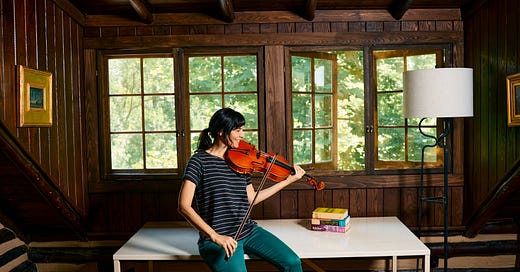



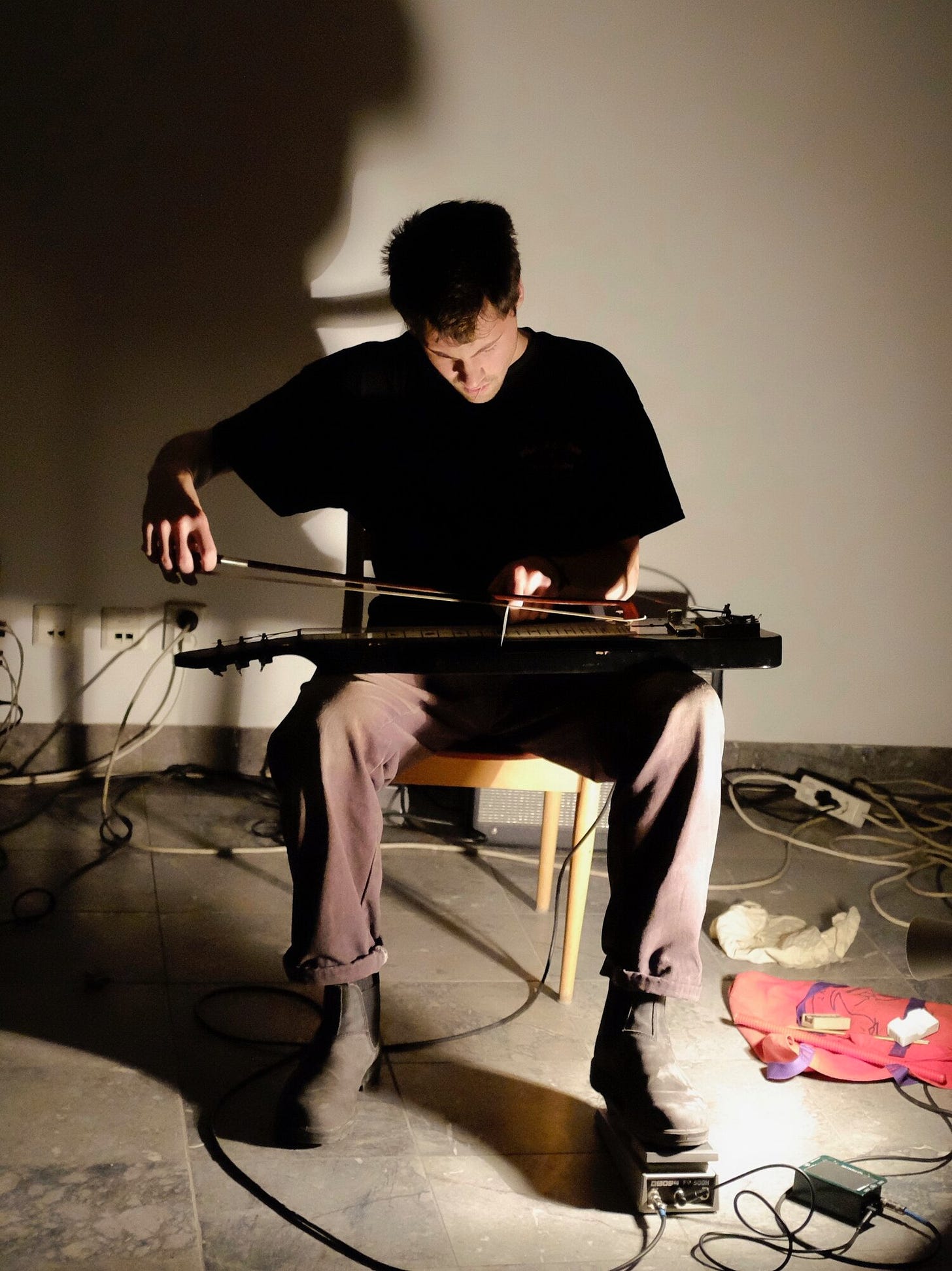
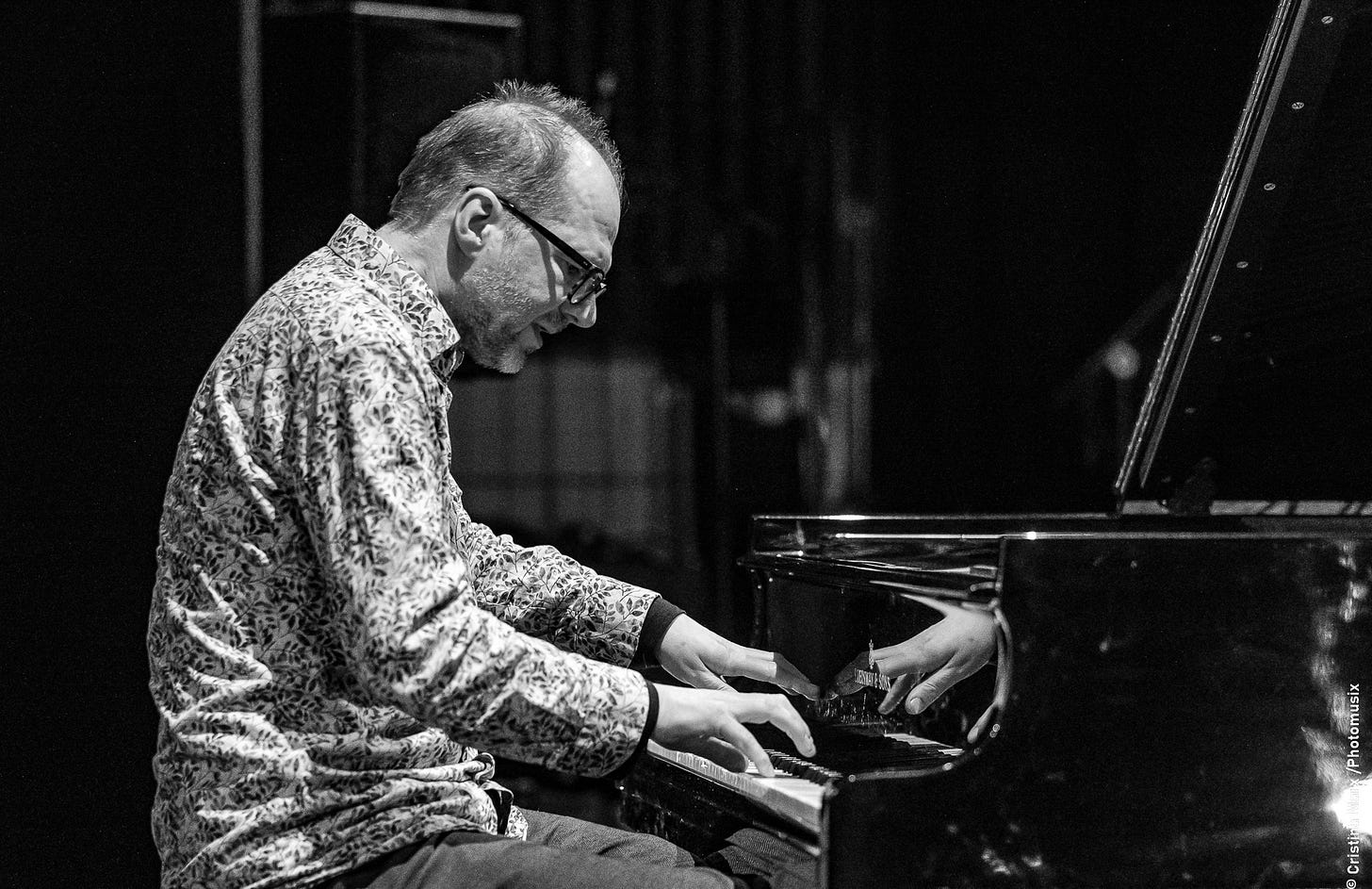
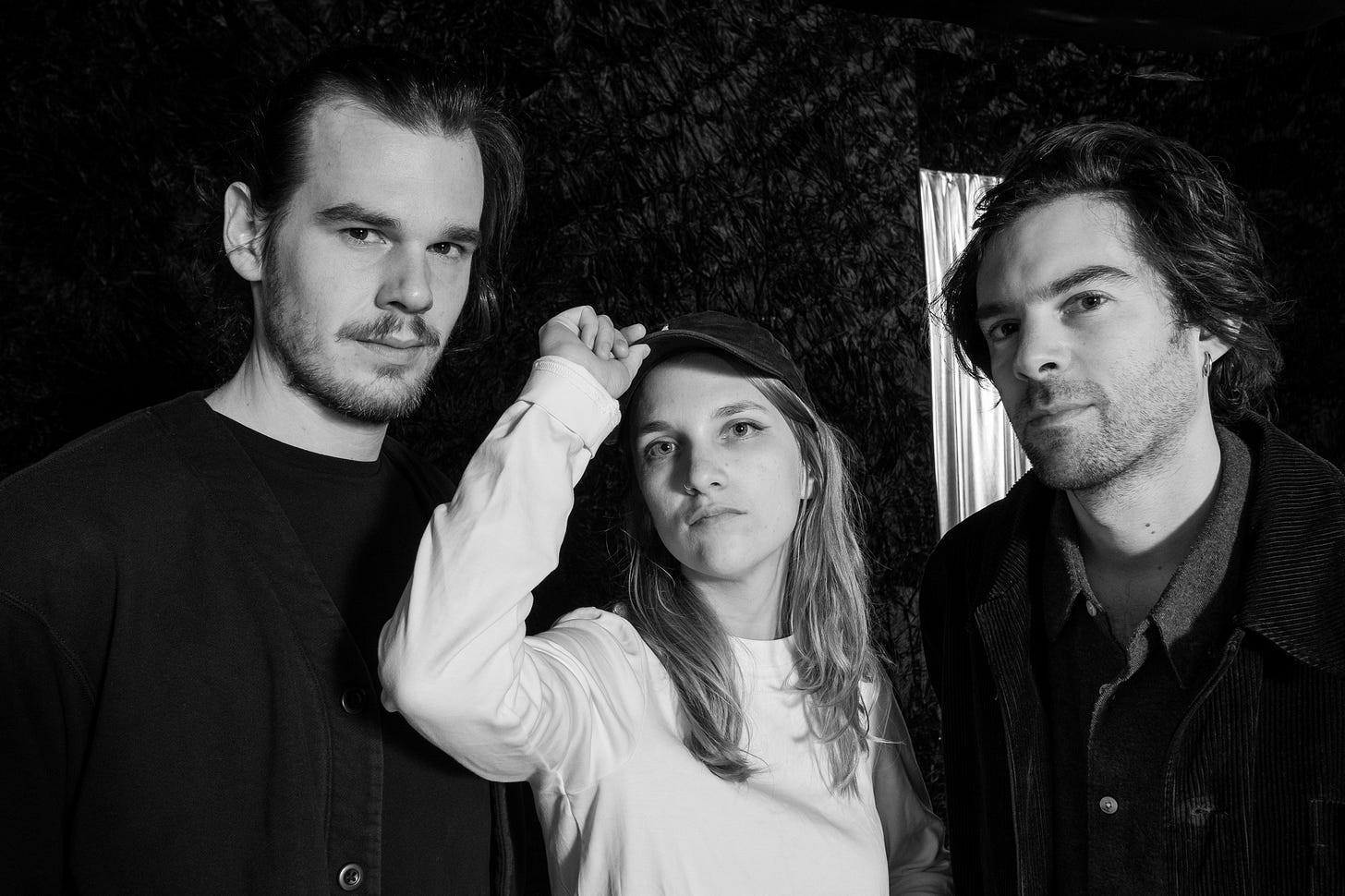
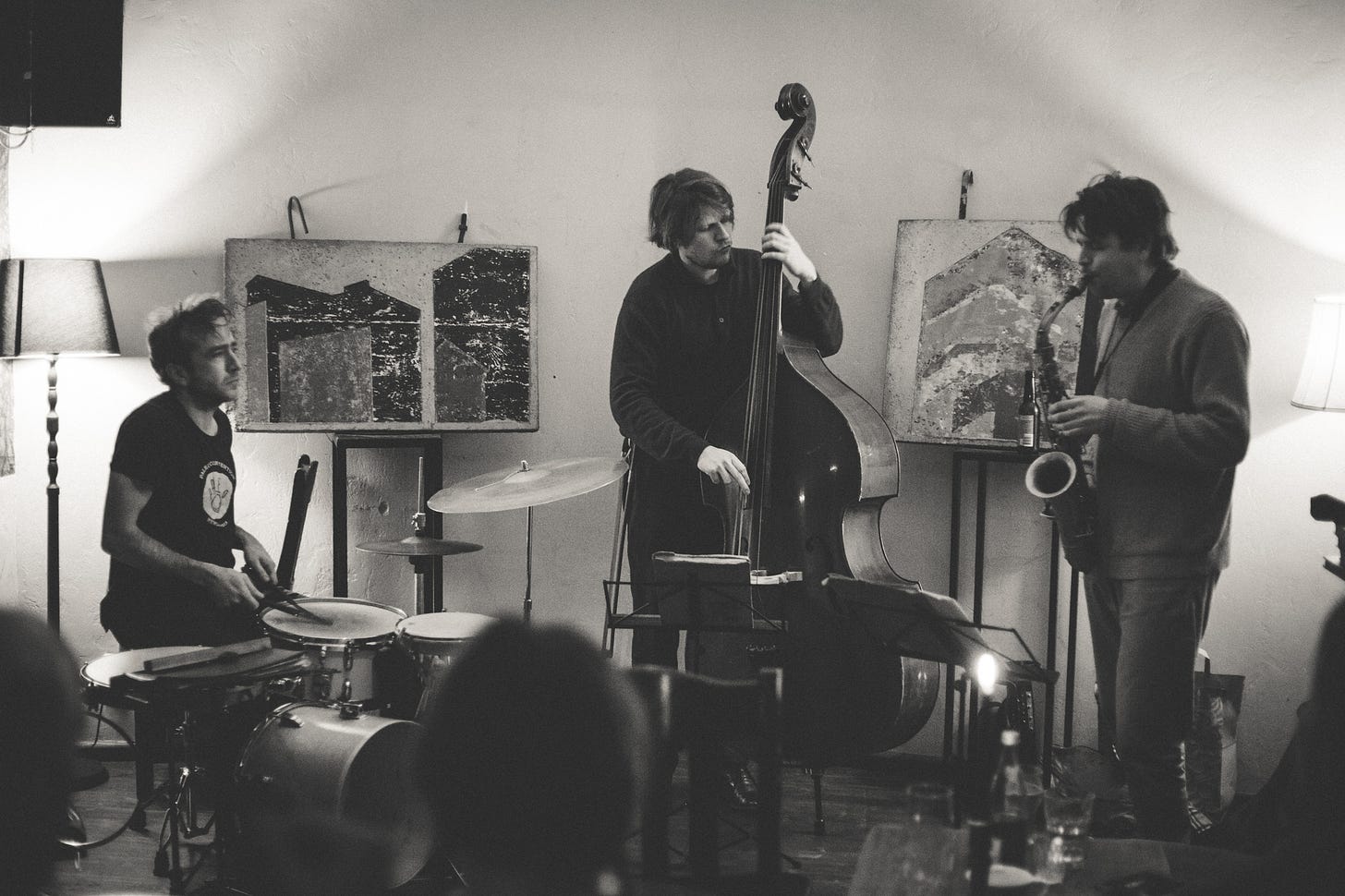

Yeah, I'm very often impressed by your writing - the way you tie the strands together while admitting that you're always in the learning stage.
Jeepers. Always so much more to hear. Thanks a million, Peter!